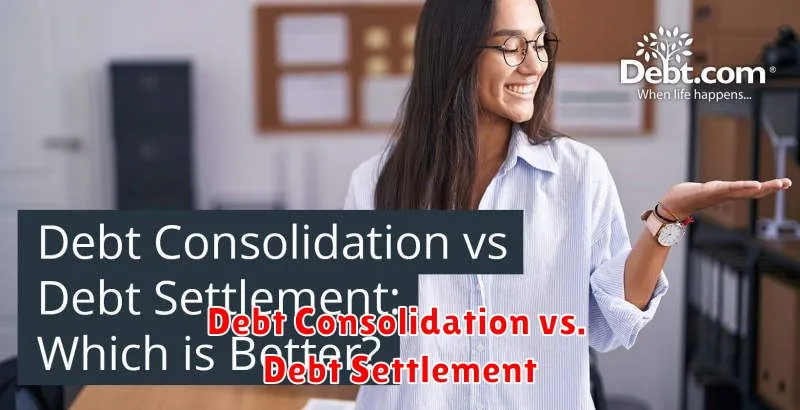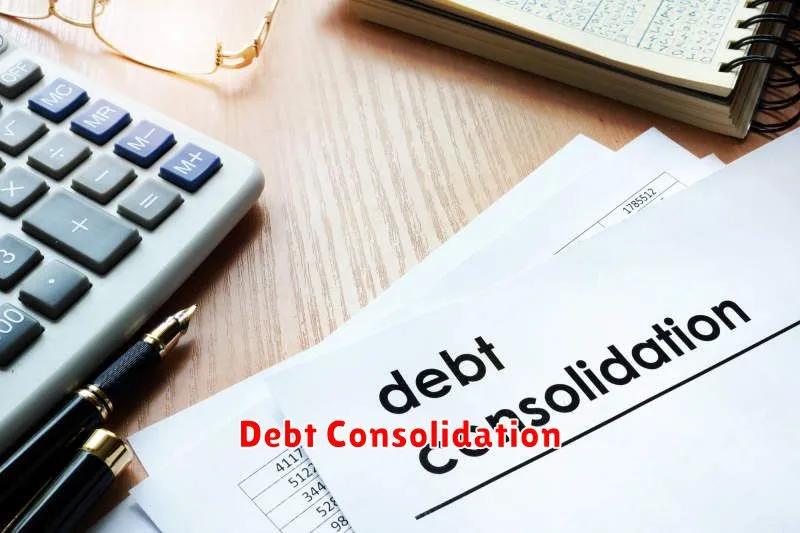Are you drowning in debt? Do you feel like you’re constantly struggling to make ends meet? If so, you’re not alone. Millions of Americans are burdened with debt, and it can be overwhelming. But there’s hope! Debt consolidation can help you simplify your finances and get back on track.
Debt consolidation is a process of combining multiple debts into one loan with a single monthly payment. This can be a great way to lower your monthly payments, reduce interest rates, and make your finances more manageable. In this article, we’ll explore the benefits of debt consolidation, how it works, and whether it’s right for you.
Understanding Debt Consolidation and its Benefits
Debt consolidation is a strategy that combines multiple debts into a single loan with a new interest rate and payment schedule. This can simplify your finances by reducing the number of monthly payments you have to make. It can also help you save money on interest if you are able to secure a lower interest rate on your consolidated loan.
Benefits of debt consolidation:
- Lower monthly payments
- Lower interest rates
- Simplified budgeting
- Improved credit score
- Reduced stress
It is important to note that debt consolidation is not a magic bullet. If you do not make responsible financial decisions, you could still end up in debt.
Types of Debt Consolidation Loans
Debt consolidation loans allow you to combine multiple debts into one loan with a single monthly payment. This can simplify your finances and potentially save you money on interest. There are several types of debt consolidation loans available, each with its own benefits and drawbacks. Here are some of the most common options:
-
Personal Loans
Personal loans are unsecured loans, meaning they don’t require collateral. They can be used to consolidate a variety of debts, including credit cards, medical bills, and personal loans. Personal loans typically have fixed interest rates, which can help you budget more effectively. However, they may have higher interest rates than secured loans.
-
Balance Transfer Credit Cards
Balance transfer credit cards allow you to transfer balances from other credit cards to a new card with a lower interest rate. This can be a good option if you have high-interest debt and want to reduce your monthly payments. However, balance transfer credit cards often have introductory periods with low interest rates, after which the interest rate may increase. Be sure to pay down the balance before the introductory period ends to avoid higher interest charges.
-
Home Equity Loans
Home equity loans are secured loans that use your home as collateral. This means that you could lose your home if you default on the loan. However, home equity loans typically have lower interest rates than unsecured loans. This is because the lender has a claim on your home if you fail to make payments.
-
Debt Management Programs
Debt management programs are offered by credit counseling agencies. They work with creditors to negotiate lower interest rates and monthly payments. Debt management programs are not technically loans, but they can be a good option for people who are struggling to manage their debt. They usually charge a fee, and you will need to be disciplined in following the program to see results.
The best type of debt consolidation loan for you will depend on your individual circumstances. Consider factors such as your credit score, debt amount, and financial goals when choosing a loan. Consult with a financial advisor to discuss your options and determine the best path for your specific needs.
Evaluating Your Eligibility for Debt Consolidation
Debt consolidation can be a great way to simplify your finances and save money on interest, but not everyone qualifies. Before you apply for debt consolidation, it’s crucial to understand your eligibility and the factors that lenders consider.
Here are some key factors that influence your eligibility for debt consolidation:
- Credit Score: Lenders typically prefer borrowers with good credit scores (generally 670 or above). A higher credit score indicates a lower risk of defaulting on the loan.
- Debt-to-Income Ratio (DTI): Your DTI is the percentage of your monthly income that goes towards debt payments. Lenders prefer a DTI below 43%, but lower ratios are generally more favorable.
- Income: Lenders need to be confident you can afford the consolidated loan payments. Stable and sufficient income is essential.
- Existing Debt Types: Debt consolidation loans typically work best for unsecured debt like credit cards, medical bills, and personal loans. They may not be suitable for secured debts like mortgages or auto loans.
Tips for Improving Your Eligibility:
- Improve Your Credit Score: Pay bills on time, reduce credit utilization, and consider disputing any errors on your credit report.
- Reduce Debt: If possible, try to pay down some existing debt before applying for consolidation.
- Increase Your Income: Seek a raise, find a side hustle, or look for ways to boost your income.
Consider Alternatives:
If you don’t meet the eligibility requirements for debt consolidation, don’t despair. You might explore other options, such as:
- Balance Transfer Credit Cards: These cards offer temporary 0% APR periods, allowing you to pay down debt without accruing interest.
- Debt Management Programs: Non-profit credit counseling agencies can help you negotiate lower interest rates and payment plans.
- Personal Budgeting: Focus on creating a detailed budget to track your expenses and identify areas where you can save.
Ultimately, evaluating your eligibility for debt consolidation requires honesty and a thorough understanding of your financial situation. If you’re unsure, consulting with a financial advisor can provide valuable insights and guidance.
Factors to Consider When Choosing a Lender
Once you’ve decided that debt consolidation is the right path for you, the next step is finding the right lender. It’s important to shop around and compare offers from several lenders to find the best deal. Here are some factors to consider when choosing a lender:
Interest rate: This is the most important factor to consider. A lower interest rate will save you money in the long run. Be sure to compare the annual percentage rate (APR) of each loan, as this includes all fees and charges.
Fees: Lenders may charge various fees, such as origination fees, closing costs, or late payment fees. Be sure to ask about all fees upfront and factor them into the cost of the loan.
Loan terms: This includes the length of the loan and the repayment schedule. Choose a loan with a repayment term that fits your budget and financial goals.
Reputation: It’s important to choose a lender with a good reputation. You can research the lender’s Better Business Bureau (BBB) rating and read online reviews from previous customers.
Customer service: You’ll want to choose a lender that provides excellent customer service. This is important in case you have any questions or need to make changes to your loan.
Calculating Potential Interest Savings
Debt consolidation can be a powerful tool for simplifying your finances, but how can you determine if it’s the right choice for you? One key factor to consider is the potential interest savings.
To calculate potential interest savings, you’ll need to gather information about your current debts. This includes the following:
- Outstanding balance for each debt
- Interest rate for each debt
- Minimum monthly payment for each debt
Once you have this information, you can use an online debt consolidation calculator or a spreadsheet to estimate your potential savings. These tools will calculate the total interest you’ll pay over the life of your loans with your current debt structure compared to a consolidated loan.
For example, if you have three credit cards with balances totaling $10,000 and average interest rates of 18%, you might be able to consolidate them into a personal loan with a lower interest rate of 10%. The calculator will show you the difference in interest paid over the loan term, potentially saving you hundreds or even thousands of dollars.
Remember that interest savings are only one factor to consider when evaluating debt consolidation. It’s essential to factor in other potential costs, such as origination fees or transfer fees, and the overall impact on your credit score.
Impact of Debt Consolidation on Credit Score
Debt consolidation can have a positive impact on your credit score, but it’s not a guaranteed win. The key is to use it strategically and responsibly. Here’s how it can affect your score:
Lower Credit Utilization Ratio: By consolidating multiple debts into a single loan, you may be able to decrease your credit utilization ratio. This ratio represents the amount of credit you’re using compared to your total available credit. A lower ratio generally results in a better credit score.
Improved Payment History: If you’re struggling to keep up with multiple payments, consolidation can help. By making a single monthly payment, you’re less likely to miss deadlines and potentially damage your credit score.
Potential for Reduced Interest Rates: A debt consolidation loan may offer a lower interest rate than your existing debts. This can save you money on interest charges, but it depends on your creditworthiness and the terms of the loan.
Potential Negative Impact: It’s crucial to note that opening a new credit account, such as a consolidation loan, can temporarily lower your score. This is because it increases your overall debt and lowers your average credit age.
Key Takeaway: Debt consolidation can be a valuable tool for improving your credit score if done correctly. It’s essential to choose a loan with a lower interest rate and manage your payments responsibly. By carefully considering the potential benefits and risks, you can leverage debt consolidation to your advantage.
Developing a Realistic Repayment Strategy
Once you’ve consolidated your debts, the next step is to create a realistic repayment strategy. This involves assessing your income and expenses, setting achievable goals, and establishing a clear plan to pay off your debt. A successful strategy will involve a combination of budgeting, prioritization, and discipline.
Start by creating a detailed budget that outlines your income and all your expenses. This will help you understand where your money is going and identify areas where you can cut back. Prioritize your debts by focusing on those with the highest interest rates first. This will help you save money in the long run. Lastly, commit to your plan and stick to it. Regularly monitor your progress and make adjustments as needed. Remember, paying off debt takes time and effort, but with a well-defined strategy, you can achieve financial freedom.
Avoiding Common Debt Consolidation Pitfalls
Debt consolidation can be a powerful tool for simplifying your finances, but it’s crucial to avoid common pitfalls that can derail your efforts. Here are some key things to watch out for:
1. Ignoring Your Overall Spending Habits: Debt consolidation won’t magically solve your spending problems. It’s essential to address the root cause of your debt by developing a realistic budget and sticking to it. Without addressing your spending habits, you’ll likely find yourself back in debt.
2. Choosing a Loan with a High Interest Rate: A seemingly attractive lower monthly payment can be deceiving if the interest rate is high. Shop around for loan options with competitive rates and terms, as higher interest rates could end up costing you more in the long run.
3. Ignoring the Fees: Many debt consolidation loans come with fees, such as origination fees, transfer fees, or prepayment penalties. Factor these fees into your calculations to get a complete picture of the true cost of consolidation.
4. Not Consolidating All Your Debt: If you’re still carrying high-interest debt after consolidation, you might not be truly simplifying your finances. Consider consolidating all your high-interest debts for maximum benefit.
5. Falling Back into Old Spending Habits: After consolidating your debt, it’s tempting to revert to your old spending patterns. Resist the urge! Stay disciplined with your budget, and you’ll be well on your way to financial freedom.
By avoiding these pitfalls, you can use debt consolidation effectively to streamline your finances, reduce your monthly payments, and get a fresh start on your financial journey.
Debt Consolidation vs. Debt Settlement

When facing overwhelming debt, it’s natural to seek solutions that simplify your finances. Two common approaches are debt consolidation and debt settlement. While both aim to reduce monthly payments and streamline your debt, they differ significantly in their methods and potential outcomes.
Debt Consolidation
Debt consolidation involves combining multiple debts into a single loan with a lower interest rate. This can be achieved through a personal loan, balance transfer credit card, or debt consolidation program offered by a credit union or bank. The goal is to make a single monthly payment, which can be lower than the sum of your previous individual payments.
Debt Settlement
Debt settlement, on the other hand, involves negotiating with creditors to pay a lump sum amount that is less than your total outstanding debt. This typically involves working with a debt settlement company that negotiates on your behalf. The downside is that settling debt can negatively impact your credit score and potentially incur penalties or fees.
Choosing the Right Approach
Choosing between debt consolidation and debt settlement depends on your individual circumstances.
Debt consolidation is often a better option for those with good credit, as it can provide a lower interest rate and potentially improve your credit score over time.
Debt settlement may be a suitable option for those with poor credit or who are struggling to make minimum payments. However, it’s essential to be aware of the potential drawbacks, such as damage to your credit score.
Maintaining Financial Health After Consolidation

Debt consolidation can be a powerful tool for simplifying your finances, but it’s crucial to remember that it’s not a magic bullet. Once you’ve consolidated your debt, it’s essential to maintain financial health and avoid falling back into debt.
Here are some key strategies to help you stay on track:
- Stick to your budget: Consolidation lowers your monthly payments, but it doesn’t erase your debt. Continue using your budget to track spending and ensure you’re not overspending.
- Make more than the minimum payment: Aim to pay more than the minimum amount each month to pay off your debt faster and save on interest costs.
- Resist new debt: It’s tempting to take advantage of your improved cash flow, but avoid opening new credit cards or taking on new loans. Keep your spending in check to prevent accumulating more debt.
- Build an emergency fund: Having an emergency fund is crucial for unexpected expenses that could derail your financial progress. Aim to save 3-6 months’ worth of living expenses.
- Monitor your credit score: Regularly check your credit score to ensure your consolidation efforts are positively impacting your credit health.
- Stay disciplined: Consolidation is a chance for a fresh start. Stay committed to your financial goals, stick to your plan, and you’ll reap the benefits of a debt-free future.
By implementing these strategies, you can leverage the power of debt consolidation to build a strong financial foundation and enjoy long-term financial stability.
Seeking Professional Guidance

While debt consolidation can seem like a straightforward process, seeking professional guidance from a financial advisor or credit counselor is crucial. These experts can provide personalized advice based on your specific financial situation.
Here’s why seeking professional guidance is vital:
- Assess your financial situation: A professional can help you analyze your debts, income, and spending habits to determine if debt consolidation is the right strategy for you.
- Explore different options: There are various debt consolidation methods, such as balance transfers, debt consolidation loans, or debt management plans. A professional can help you understand the pros and cons of each option and choose the best fit.
- Negotiate with creditors: A credit counselor may be able to negotiate lower interest rates or payment terms with your creditors, potentially saving you significant money in the long run.
- Create a realistic budget: A financial advisor can assist in developing a comprehensive budget that helps you manage your finances effectively, even after consolidating your debt.
- Stay on track: Having a professional guiding you can increase your chances of successfully managing your debt and avoiding further accumulation.
Remember, seeking professional guidance can save you time, money, and stress when navigating the complexities of debt consolidation.

